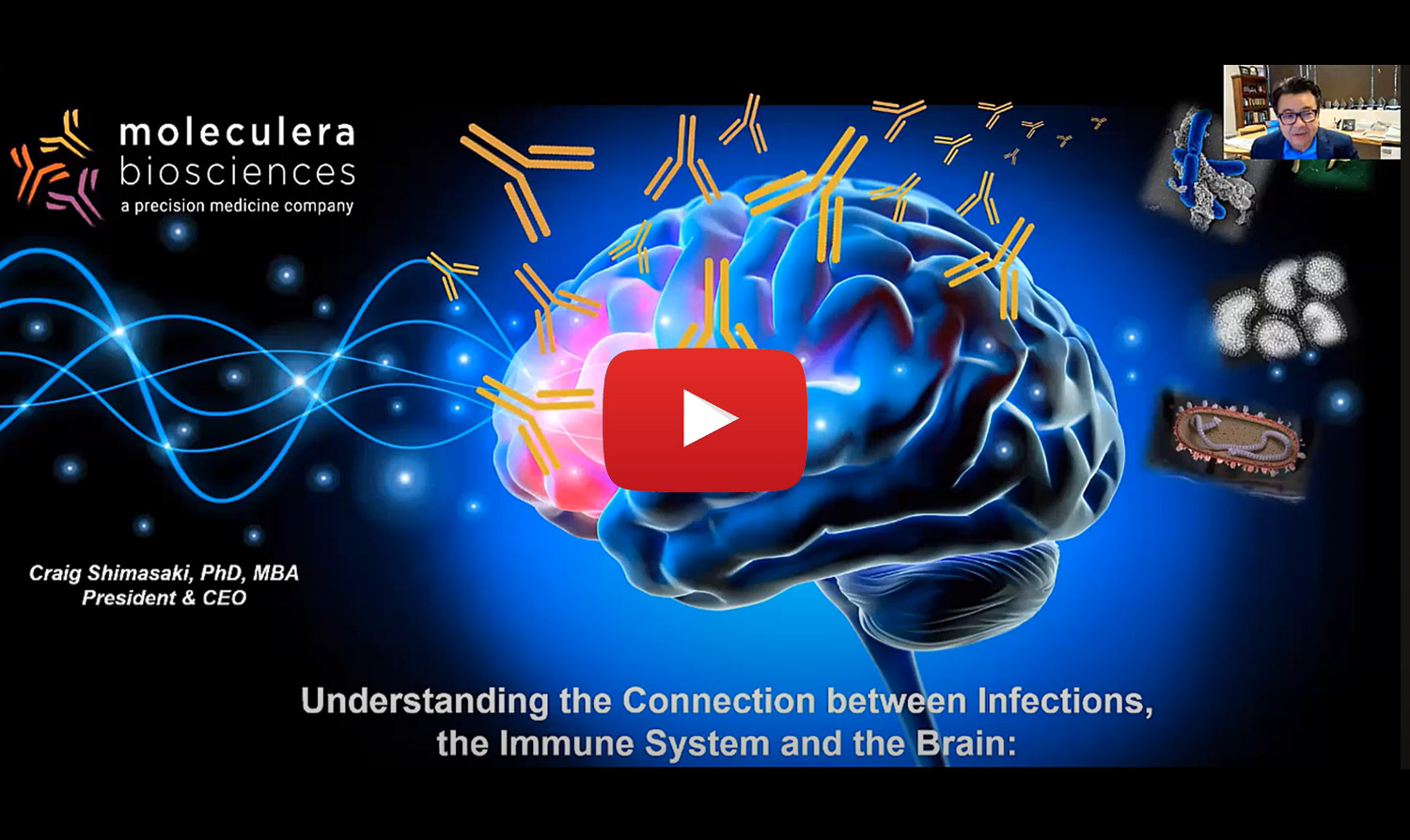Webinars

Webinar Info
- Speaker: Craig Shimasaki, PhD, MBA – President & CEO, Moleculera Biosciences
- Aired: August 7, 2024
ABOUT THE WEBINAR
Could your treatment-resistant symptoms be due to an underlying infection-triggered autoimmune response?
Common infections (i.e., strep, influenza and mycoplasma pneumoniae) can trigger an abnormal autoimmune response, in which antibodies produced to destroy harmful pathogens (i.e., bacteria, viruses) mistakenly attack portions of the brain. This autoimmune attack disrupts how cells and receptors function and causes brain inflammation, resulting in a range of neuropsychiatric symptoms.
This presentation will review the biological process behind these infection-triggered autoimmune neuropsychiatric disorders. Dr. Shimasaki will discuss how infections can impact the immune system and the brain, leading to the onset of various neurologic and psychiatric symptoms, including OCD, tics, depression, anxiety and even seizure-like movements.
Dr. Shimasaki will describe several signs and symptoms that may help identify individuals with an autoimmune-induced neuropsychiatric condition. He will also review how testing with the Autoimmune Brain Panel™ can assist clinicians in determining whether symptoms may be due to an autoimmune response, rather than a primary neurologic or psychiatric disorder.
The presentation will highlight several patients who, after testing positive on the Panel, were treated successfully with a complete resolution of their symptoms.
PRESENTER
Craig Shimasaki is President and CEO of Moleculera Biosciences, a neuroimmunology precision medicine company focused on identifying underlying roots of neurologic, psychiatric, and behavioral disorders triggered by an autoimmune response. He is a medical research scientist with over 35 years of translational development experience in biochemical interactions, molecular biology, viral pathogenesis and infection-triggered neuropsychiatric disorders.
Dr. Shimasaki has worked at all stages of research and development from bench to bedside. His research included epitope mapping of HIV proteins, genetic based risk predictors of breast cancer, influenza and RSV diagnostics and therapeutics and pathogenesis of infection triggered neuropsychiatric disorders. As a businessperson, he co-founded multiple companies and led multiple products through the FDA approval process and is a co-inventor on multiple patents.
Dr. Shimasaki started his career at Genentech. He received his BS in Biochemistry from University of California at Davis, his PhD in Molecular Biology from the University of Tulsa, and his MBA from Northwestern University, Kellogg School of Business. He is an Adjunct Professor at the University of Oklahoma where he teaches biotechnology entrepreneurship. His passion is to help translate scientific and medical discoveries into acutely needed products so that more patients can live healthier lives.
Disclosure
The webinar content has been made available for informational purposes only. The information provided is not intended to be medical or healthcare advice for any individual medical problem, nor a substitute for medical or professional advice and services from a qualified healthcare provider.
By attending or viewing the webinar, you acknowledge and agree that we have not represented that any content provided in this webinar has the ability to diagnose a medical condition, prescribe treatment, or perform any other tasks that constitute the practice of medicine.
Moleculera hereby disclaims any and all liability to any party for any direct, indirect, implied, punitive, special, incidental, or other consequential damages arising directly or indirectly from any use of the webinar content, which is provided as is, and without warranties.
All rights reserved. No part of this presentation may be reproduced, distributed, or transmitted in any form or by any means, including recording, photocopying, or other electronic or other methods without the prior written consent of the publisher.
Scroll through the video to watch specific chapters. Click below.
4:29 – Financial impact on families and patients
6:23 – Symptoms treated, not etiology or cause
8:45 – How can infections trigger neuropsychiatric symptoms?
11:10 – Other immune-mediated disorders
12:05 – How does this occur biologically?
18:58 – Infections associated with these autoimmune encephalopathies
20:32 – What is molecular mimicry?
22:24 – Autoimmune Brain Panel
25:03 – Case study: 8-year-old female - numerous neuropsychiatric symptoms
26:46 – Case study: 16-year-old female - OCD, tics, restricted food intake
28:39 – Case study: 20-year-old female - OCD, neuropsychiatric symptoms
30:29 – Case study: Initially diagnosed with schizophrenia
31:37 – Guidelines for diagnosis and treatment - PANS/PANDAS
34:37 – Patient success stories
